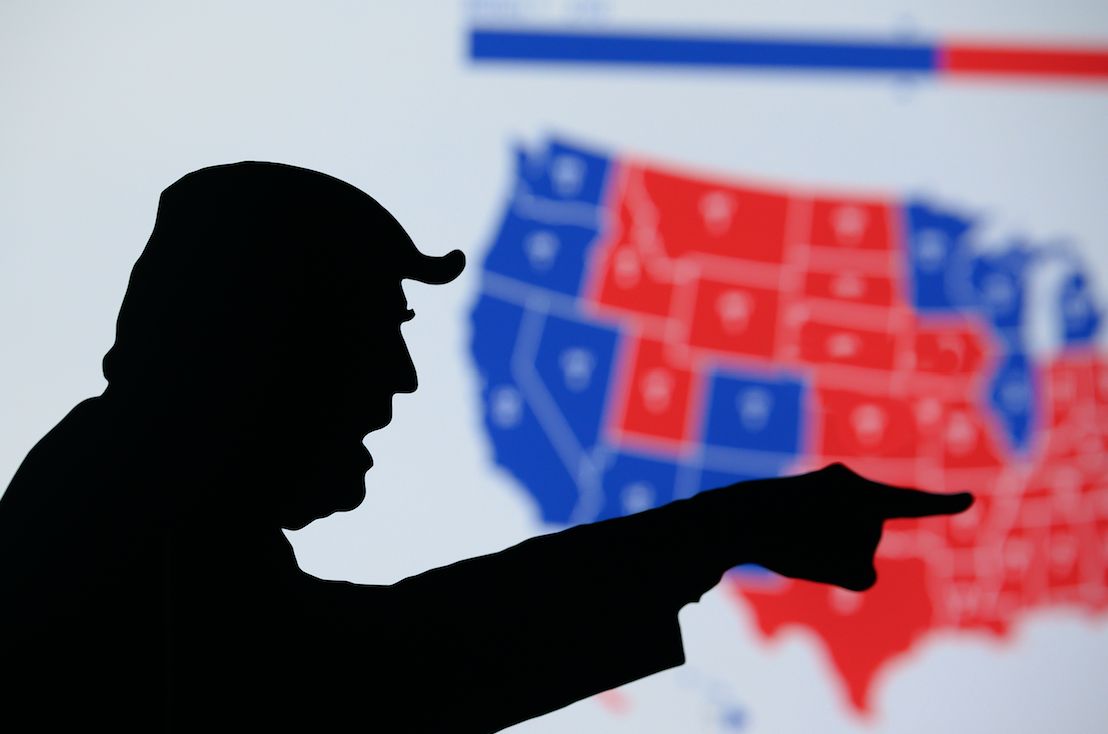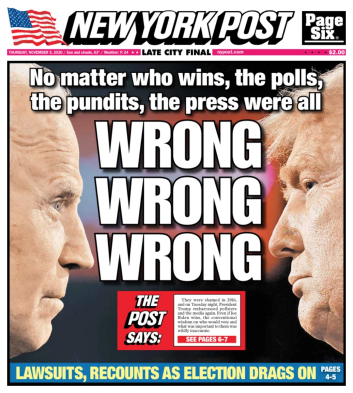
The poll results are in, and they don’t look good for the US press.
An online survey of 454 Press Gazette readers this week has found that 43% think the US media did a “very bad” job of reporting on the presidential election.
However, if the last two US election campaigns have taught us anything, it’s that we should treat polls with scepticism.
[Sign up for Press Gazette’s must-read newsletters: Media Monitor (strategic insight every Thursday), PG Daily and Marketing Matters]
‘Out of touch’ and ‘WRONG, WRONG, WRONG’
As in 2016, when Republican Donald Trump claimed a shock victory over Hillary Clinton, the media has faced accusations of being “out of touch” with the American people. This time around, although Democrat Joe Biden won the election, he did not win by the margin that many had expected.
Kyle Pope, the editor-in-chief of the Columbia Journalism Review, published a damning assessment as it became clear that Biden’s margin of victory over Trump has smaller than expected, telling readers, “it’s 2016 all over again”.
“Once again, opinion polls were overhyped and under-scrutinised,” he wrote, claiming the results as evidence that newsrooms “leaned too heavily on polls as a substitute for on-the-ground reporting, and they were led astray”.
He added that journalists “spent too much time talking to each other on Twitter” and that media groups “made it all but impossible to envision that, despite the wealth of reporting on the president’s lies and his racism and his circus – nearly half the country remains beholden to the man and his beliefs”.
 On the same day, Meghan McCain, co-host of The View on Fox News, tweeted: “At what point is our collective media going to accept just how out of touch with the majority of the country they are?!?
On the same day, Meghan McCain, co-host of The View on Fox News, tweeted: “At what point is our collective media going to accept just how out of touch with the majority of the country they are?!?
“I predict they won’t, they will just quadruple down – rather than accept, learn and try to actually represent so many of the voters they so clearly disdain.”
And the New York Post, which was the only major American newspaper to endorse Trump for president, published a front page declaring, “No matter who wins, the polls, the pundits, the process were all WRONG, WRONG, WRONG”.
‘There were plenty of people saying: Don’t discount Trump’
Emily Bell, the founding director of the Tow Center for Digital Journalism at Columbia Journalism School, disagrees with much of the criticism levelled at the media over coverage of this year’s election.
She told Press Gazette: “Did the press do a very bad job in conveying that it was going to be a comfortable victory for Biden? I thought the really interesting thing about the coverage running into the polling day was that no news organisation was saying: ‘Trust the polls.’ Most people were saying: ‘It looks like it could be Biden, but maybe by a slim majority.’
“If you carefully read political coverage, there were plenty of people saying: ‘Don’t discount Trump. Don’t rely on the polls.’
“And I think that one thing that was different from 2016 was, first of all, enormous and rightful scepticism of polls – even though there were a fair number of places saying polling would be different this time. Actually, it was a little different, but not different enough.”
She praised large news groups – including the New York Times, Washington Post and ProPublica – for “consistently breaking really big, important, serious stories” in the lead-up to the election.
“They brought huge amounts of transparency into both campaigns,” she said. “Which actually we had last time as well. It’s worth remembering that by the time we got to election day in 2016, we knew more about Hillary Clinton and Donald Trump than we had about any other candidates probably in the history of American politics. And we went through that cycle again this time as well…
“If you look at the output of the newsdesks, the major political desks, there’s been a very high volume of incredibly good reporting right throughout the last four-year cycle.”
Instead of blaming the press for poor coverage, Bell said the “single most disturbing and striking thing about this election” was false information that was being spread online and on social media.
David Chavern, the chief executive of news publisher body the News Media Alliance, agreed that many of the media problems of the 2020 election originated on digital platforms like Facebook.
“We are all subject to a huge and growing risk of being dragged around by the social media rumour machine,” he said. “And I think that news publishers were a good and consistent antidote to a whole lot of bad information in the digital ecosystem”
Chavern felt the news media “generally did a good job of covering difficult and intensely partisan elections”.
“Polls are a complex and difficult problem,” he added. “There are obviously clear technical problems with modern political polling that are related to response rate.
“Going into this election, there was a consistent message from professional pollsters that they had fixed their problems. But if you are in the prediction business, everyone gets to see how well you did and pollsters clearly still have a lot of work to do.
“News publishers cover polls because people have an intense interest in understanding voters and trying to predict outcomes.
“Going forward, I don’t think that publishers will stop covering polls, but a lot of thinking has to go into how those polls are framed and explained to readers.”
Polls are ‘not a replacement for reporting in these communities’
W. Joseph Campell, a professor of communication at American University whose recent book, Lost In A Gallup, examined US presidential election polling failures, told Press Gazette: “The dominant narrative of this campaign was off base. And there’s no doubt it was driven by polls. The polls established a narrative that Biden was going to win in a blowout and that the blue wave he would lead would carry the Democrats to a clear majority in the Senate and a fortified majority in the House of Representatives. And none of that happened.”
Campbell, a former journalist, added: “Journalists do too have a responsibility here, and I’m not so sure they’re going to be eager to fulfill this. ‘Well, Biden won, and that’s enough for us’ kind of thing.”
Jessica Huseman, a Texas-based journalist who covers voting rights and election administration for ProPublica, agrees that the media is “overly reliant on polls” and is concerned that not enough national reporters are based outside of America’s main news hubs.
“I think that polls are, on balance, very useful for determining the general direction of the American electorate but it is not a replacement for reporting in these communities,” she said.
“National publications would absolutely benefit by placing reporters throughout the country, rather than isolating them on the east and west coast. The number of reporters in major metro areas that are not on the coast is incredibly small – I am one of a few national reporters not living in New York or California or DC.
“I think if the American media is to appropriately cover the American voter population, then we need to live among them and speak to them on a daily basis.”
She added: “Alternatively, national organisations need to become more comfortable with partnering with local media instead of parachuting in and covering their own stories.
“This has been the model that ProPublica has used since our founding, and I think that we have been able to do more impactful stories because we are open to the expertise of local journalists and don’t think that we are better at their jobs than they are.
“Local reporting is invaluable in the United States, and I think it has been dismissed by national reporters for far too long.”
Top picture credit: Shutterstock
Email pged@pressgazette.co.uk to point out mistakes, provide story tips or send in a letter for publication on our "Letters Page" blog
